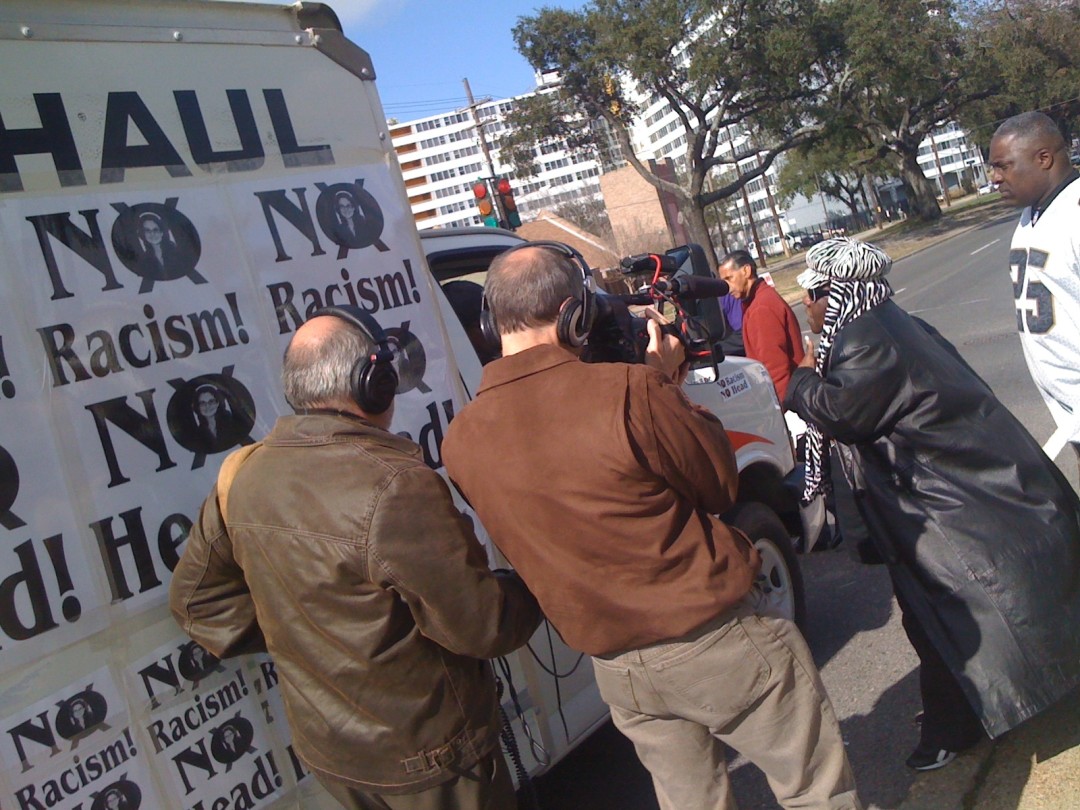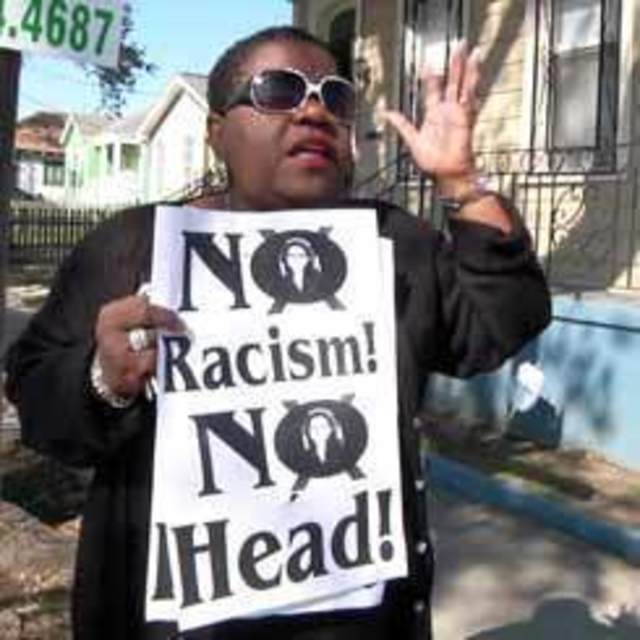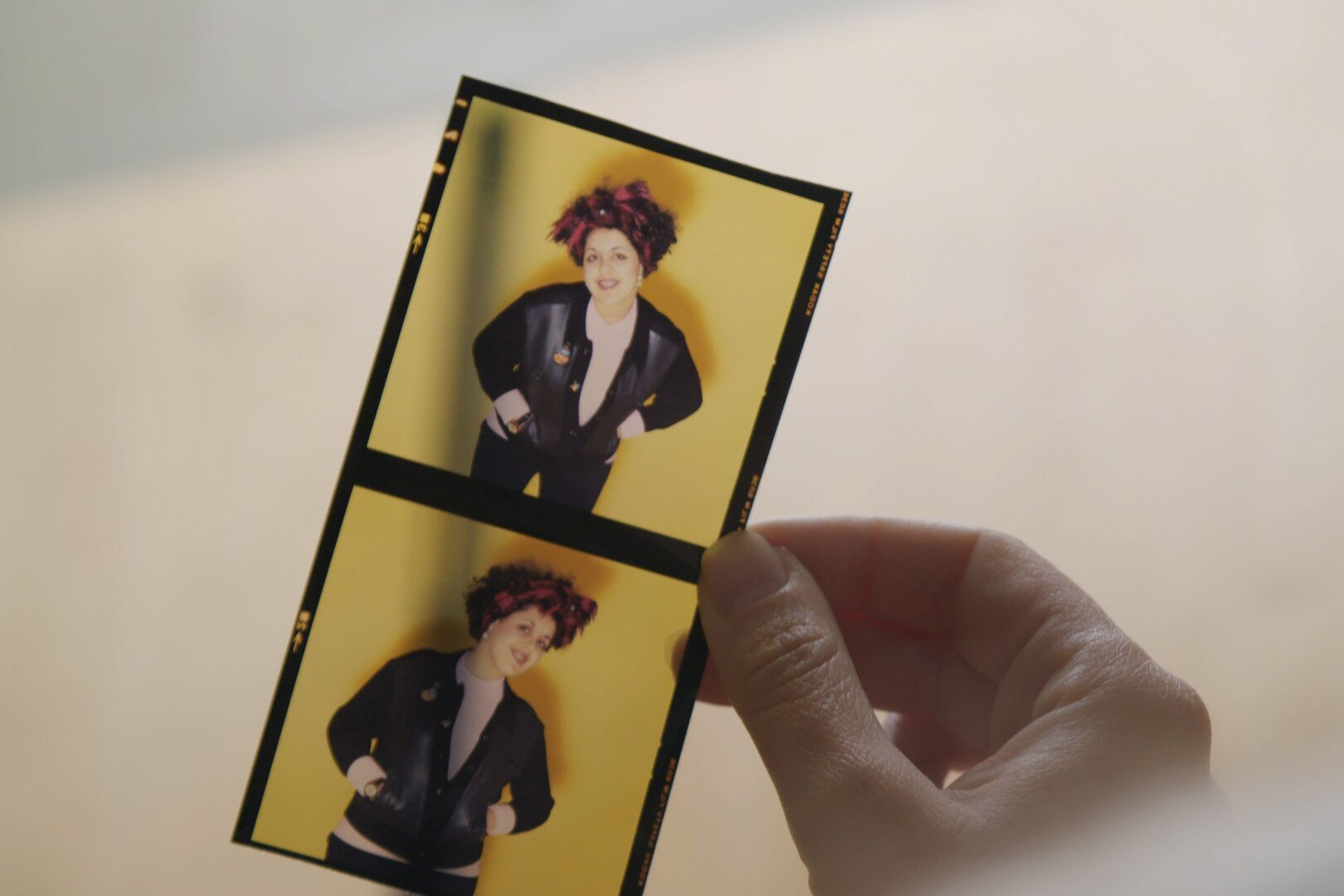New Documentary Examines New Orleans After Katrina

Getting Back to Abnormal
May 12 at 7
Free
14 Pews
800 Aurora St.
281-888-9677
14pews.org
After the 2005 devastation of New Orleans by Hurricane Katrina, many locals fled their storm- and flood-ravaged community to seek higher ground and greater opportunities in other cities. (Like, Houston.) The hearty folks who remained – or returned – found the population significantly altered by the diaspora, and city politics in flux due to demographic shifts.
Getting Back to Abnormal, a fascinating documentary that will have a free-admission screening Tuesday at 14 Pews, examines how much has changed, and how much hasn’t, in regard to the political dysfunctions and racial dynamics that characterize the Crescent City. Specifically, the movie focuses on Stacy Head, an outspoken and often polarizing white “reform politician” who wins a seat on the New Orleans City Council in the wake of Katrina. Four years later, Head – aided by Barbara Lacen-Keller, her similarly uninhibited African American campaign advisor – runs for re-election. But can she capture enough of the black vote to emerge victorious in a city where Caucasians remain a minority?
For Paul Stekler – who co-directed Getting Back to Abnormal with fellow filmmakers Louis Alvarez, Andrew Kolker and Peter Odabashian – the movie offered an opportunity to give an inside view of a city known for outrageous behavior. “We’re not New Orleanians,” he says, “but we have lived there a long time. Andy and Louie got their start there. They were, like, mainstays of the New Orleans Video Access Center back in the '70s and '80s, and made a lot of interesting material. And back in 1986, I helped run a mayoral campaign for Bill Jefferson -- who's now in the federal penitentiary.”

Stekler – whose previous credits as a documentarian include George Wallace: Settin’ the Woods on Fire and Last Man Standing: Politics Texas Style – will be on hand Tuesday for a pre-screening meet-and-greet and a post-screening Q&A at 14 Pews. We caught up with him at his office in Austin (where he teaches documentary film production and serves as chair of the Radio-Television-Film Department at UT) and he graciously fielded questions about his film.
You and your co-directors have been involved with several films about politics. But even with that experience, were you surprised by any elements of New Orleans–style politics?
Not really. Three of us—Andy Kolker, Louie Alvarez and I—we lived there for years and so nothing surprised us, per se. I think it was more a question of finding just how much was New Orleans going to go back to its cultural norms. Or, had the culture and the politics changed post-Katrina?
As our film indicates, a large number of people who left the city [after Katrina] have not come back to New Orleans. Some of them have not come back because they found places — like Atlanta and Houston, the main places where people ended up — that had better schools and perhaps better job opportunities, and they decided it was better to stay there. Now, it's a hell of a way to have to figure that out, that they’re better off elsewhere, but this is the way these things happen sometimes.
Actually, to get back to your question, I think I was surprised by the number of people that hadn't moved back. I didn't quite realize they were a quarter of the city. And I don't think I quite realized the level of devastation caused by Katrina. At the same time, I was – well, not surprised, but really inspired by the resilience of the people that live there. A lot of the neighborhoods took charge of their own areas to be able to make a comeback, which was really pretty interesting.
And I'm always surprised at just how fabulous New Orleanians are in expressing themselves on camera. Because they never fail to jump over a very high bar in terms of just being amazing speakers, and just making connections that I couldn't write. I’m talking about people making statements like, "New Orleans has some of the whitest black people, and some of the blackest white people." I probably agree with them, but I would not be able to write that.
As your film makes clear, the racial and political dynamics of New Orleans certainly have changed in the decade since Katrina. Back in the early ’70s, while I was still living there, a friend – not a racist, by any means – told me he thought Moon Landrieu would be the city’s last white mayor.
Obviously that wasn't the case. Things change, and politics is not static. And as you see in our film, Mitch Landrieu [son of Moon Landrieu] gets elected. It's partially because of population change, and partially because of the specific politics of the time. That might have been a different thing if there'd been a much stronger African American candidate running against Landrieu. And I wouldn't be surprised at all if the next mayor of New Orleans is African American. It really depends. You still have a majority black population. But politics is not always completely racial. That's partially what our story is about, that Stacy Head wouldn't get elected without some African American support.
As a documentarian, you must be overjoyed to find a colorful subject like Stacy Head. And when you find her and her political advisor, Barbara Lacen-Keller… well, that’s like winning the daily double, right?
Yeah, I totally agree. We're just very, very lucky. Again, I think we're people that knew New Orleans very well. And we're experienced filmmakers. But at the same time, sometimes you just bump into people like them, and you're lucky to have found them. On the other hand, you have to be skillful enough to know that you found them.
You were speaking about the colorful ways that New Orleanians express themselves. Well, you can’t get much more colorful than those two.
Yeah. You look at the confrontation on Election Day between Barbara and the guys with the “No Head, No Racism” signs — you can't make that up. It’s just amazing to have Stacy on the street, when we asked her about the signs, going, "Well, at least they used a nice picture of me." This is a very New Orleans kind of deal.
What was your take on Stacy Head as a politician?
Stacy is a reformer. And whether you like her or not, she has never changed in terms of why she's in politics. Some people like her personality; other people don't. But I think as time has gone on, she's become a much better politician, per se, in terms of, as she said, learning to be more cognizant of how some of the things she says might sound.
There is a rather jarring moment when she speaks disparagingly of wealthy black preachers “taking advantage of their flocks” and trying to influence voters.
She was speaking specifically of her opponents. And in campaigns, that's a pretty lightweight accusation in New Orleans politics.
But when a white candidate says something like that about a black opponent, it can easily be labeled racist.
Sure. And some of her opponents tried to do that — and it didn't work. She was able to get, I believe, close to 30 percent of the African-American vote. And at this point, she’s one of the most prominent politicians outside of Mitch in the city.
What would you say sets your film apart from other documentaries about post-Katrina New Orleans?
I think we made a film about the real place. I mean, for some people, I think it makes them uncomfortable because New Orleanians are not at all shy to talk about race, and to talk about how they actually feel, and race is a very difficult topic for a lot of Americans to talk honestly about. When we had our premiere in the city, everybody in the film was there. And a lot of those people hate each other, just don't like each other. But they were happy to party together in New Orleans. It's the weirdest, most unique culture of any place I've lived in in the United States. And I'm just happy that we made a really good film that really depicts the New Orleans that we know and love — and are frustrated by at the same time.




